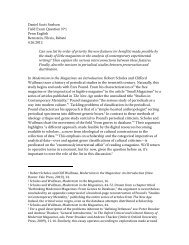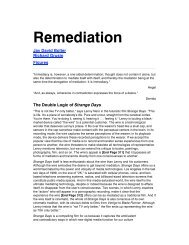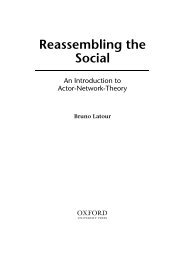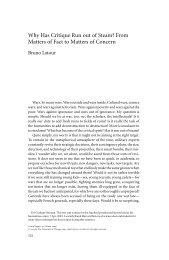The Exploit: A Theory of Networks - asounder
The Exploit: A Theory of Networks - asounder
The Exploit: A Theory of Networks - asounder
You also want an ePaper? Increase the reach of your titles
YUMPU automatically turns print PDFs into web optimized ePapers that Google loves.
26 Nodes<br />
life. Even the U.S. military, a bastion <strong>of</strong> vertical, pyramidal hier archy,<br />
is redefining its internal structure around network architectures, as<br />
the military strategists Arquilla and Ronfeldt have indicated in their<br />
work. <strong>The</strong>y describe here a contemporary mode <strong>of</strong> conflict known as<br />
“netwar”: “Netwar is about the Zapatistas more than the Fidelistas,<br />
Hamas more than the Palestine Liberation Organization (PLO), the<br />
American Christian Patriot movement more than the Ku Klux Klan,<br />
and the Asian Triads more than the Cosa Nostra.” 1 <strong>The</strong>se in/ out lists<br />
are, <strong>of</strong> course, more fun to read than they are accurate political evaluations,<br />
but it is clear that the concept <strong>of</strong> connectivity is highly privi -<br />
leged in today’s societies.<br />
In fact, the idea <strong>of</strong> connectivity is so highly privileged today that it is becoming<br />
more and more difficult to locate places or objects that don’t, in some<br />
way, fit into a networking rubric.<br />
This is particularly the case as the Fidelistas and so on are further<br />
eclipsed by their network - savvy progeny. <strong>The</strong> 2001 USA PATRIOT<br />
Act and other legislation allowing increased electronic surveillance<br />
further reinforce the deep penetration <strong>of</strong> networked technologies and<br />
networked thinking. One wonders if, as networks continue to propagate,<br />
there will remain any sense <strong>of</strong> an “outside,” a nonconnected locale<br />
from which we may view this phenomenon and ponder it critically.<br />
In today’s conventional wisdom, everything can be subsumed under a<br />
warm security blanket <strong>of</strong> interconnectivity. But this same wisdom hasn’t<br />
yet indicated quite what that means, nor how one might be able to draft a<br />
critique <strong>of</strong> networks.<br />
All this fanfare around networks highlights the continued indis -<br />
sociability <strong>of</strong> politics and technology. <strong>The</strong>re are several sides to the<br />
debate. <strong>The</strong> technophilic perspective, such as that expressed by Howard<br />
Rheingold or Kevin Kelly, is an expression <strong>of</strong> both a technological<br />
determinism and a view <strong>of</strong> technology as an enabling tool for the elevation<br />
<strong>of</strong> bourgeois humanism in a broadly general sense. <strong>The</strong> juridical/<br />
governance perspective, seen in the work <strong>of</strong> Lawrence Lessig, Yochai









